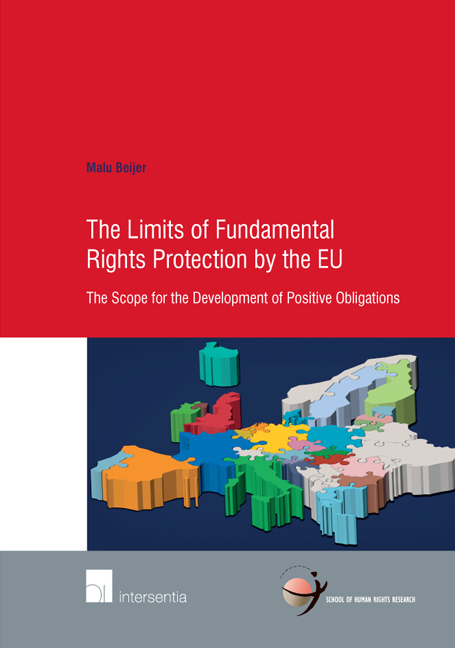 Limits of Fundamental Rights Protection by the EU
Limits of Fundamental Rights Protection by the EU from PART II - THE SCOPE FOR THE DEVELOPMENT OF POSITIVE OBLIGATIONS WITHIN THE CONTEXT OF EU LAW – AN ANALYSIS OF THE SPECIFIC PARAMETERS OF THE EU LEGAL ORDER AND THE EU SYSTEM OF FUNDAMENTAL RIGHTS PROTECTION
Published online by Cambridge University Press: 27 September 2018
INTRODUCTION
The scope of application of EU fundamental rights is of great significance. It is of importance to determine at what point fundamental rights matters fall within the scope of Union law, because then the ECJ becomes competent to exercise judicial review and to set fundamental rights standards. This has implications for the powers that can be exercised by the EU institutions and the member states in the respective areas. Moreover, if the ECJ were to apply EU fundamental rights to situations where there are no rules of EU law, and therefore no powers for the EU, this would have the effect of unacceptably extending the EU ‘ s powers. The scope of application of EU fundamental rights is also of particular importance for exploring the (potential) development of positive obligations on the basis of EU law. The main question to be asked in that respect is to what degree it can be expected that positive obligations could indeed fall within, or rather outside, the scope of application of EU law.
In answering this question, the meaning of Article 51 of the Charter is of central concern. This chapter discusses, first, how scholars have interpreted the meaning of this provision (section 9.2.). What scope and what limits do they derive from this provision for the protection of fundamental rights by the ECJ, and how do they expect the ECJ to accommodate a notion of positive obligations into EU law on the basis of this provision? By finding answers to those questions, a theoretical framework for a development of positive obligations is set out which aims to respect the limits laid down in Article 51. Next, it is examined how the ECJ itself has interpreted and applied Article 51 of the Charter (section 9.3.). In this regard, three types of situations which the ECJ has found to fall within the scope of application of EU fundamental rights will be discussed. It is submitted that the EU in fact enjoys different types of powers in these three types of situations. The existence of these different types of powers needs to be acknowledged when assessing whether it would be possible for the ECJ to develop positive obligations in its case-law.
To save this book to your Kindle, first ensure [email protected] is added to your Approved Personal Document E-mail List under your Personal Document Settings on the Manage Your Content and Devices page of your Amazon account. Then enter the ‘name’ part of your Kindle email address below. Find out more about saving to your Kindle.
Note you can select to save to either the @free.kindle.com or @kindle.com variations. ‘@free.kindle.com’ emails are free but can only be saved to your device when it is connected to wi-fi. ‘@kindle.com’ emails can be delivered even when you are not connected to wi-fi, but note that service fees apply.
Find out more about the Kindle Personal Document Service.
To save content items to your account, please confirm that you agree to abide by our usage policies. If this is the first time you use this feature, you will be asked to authorise Cambridge Core to connect with your account. Find out more about saving content to Dropbox.
To save content items to your account, please confirm that you agree to abide by our usage policies. If this is the first time you use this feature, you will be asked to authorise Cambridge Core to connect with your account. Find out more about saving content to Google Drive.